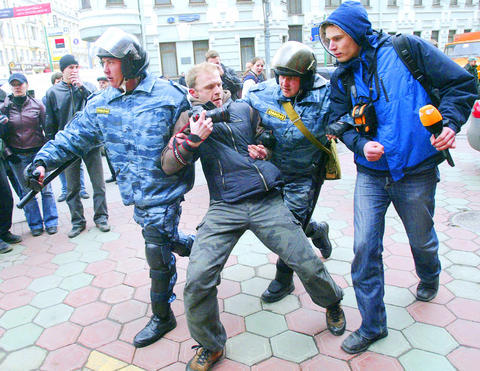Riot police clashed with opposition supporters yesterday at the end of an anti-Kremlin protest in Russia's second-largest city, chasing small groups of demonstrators, beating some on the ground and hauling them into police buses.
It was not immediately clear what sparked the violence after the rally, which city authorities had authorized and took place under a heavy police presence with at least one helicopter hovering above. No information was immediately available about how many people had been injured.
City authorities gave permission for the rally in a square on the edge of central St Petersburg, but banned plans for the demonstrators to march afterwards to the city's government headquarters.

PHOTO: AP
Police trucks and helmeted officers blocked the planned march route. At the end of the 90-minute rally, organizers did not call on protesters to march along the banned route, but suggested instead that they go on their own to the city government building over the next few days. When the rally dispersed, most participants went to a nearby subway station, where clashes broke out.
In one, police chased a group that included Sergei Gulyayev, a member of the city legislature who had been arrested at a protest last month. Police grabbed some members of the group and pounded them over the head with truncheons before putting them on buses. It was not immediately known if Gulyayev was among those taken away.
In another clash, police charged a group holding a banner professing love for the city.
The violence came a day after clashes at a similar opposition protest in Moscow, where police detained at least 170 people. The protests in both cities were called to focus on complaints that Russia under President Vladimir Putin is strangling democracy ahead of presidential and parliamentary elections.
"Yesterday, it became clear that the authorities won't be making any concessions. They have started a war on people," Eduard Limonov, head of the National Bolshevik Party, told yesterday's rally.
"Putin and his team are sitting on sacks of gold, at the same time the country is breaking apart in all spheres," said demonstrator Sergei Nilupov, a 56-year-old teacher.
One of the rally organizers, Olga Kurnosova, told reporters that police detained her near her home a few hours before the demonstration.
She said by telephone from a police station that she was held for distributing brochures about the rally, which she said was an artificial pretext because city authorities had given permission for the demonstration.
"It's clear that the reason was to keep me away from the demonstration," she said.
The weekend protests were part of a series of "Dissenters' Marches" called by the Other Russia umbrella group that brings together an array of opposition factions including one led by former world chess champion Garry Kasparov.
Kasparov was among those arrested in Moscow and was released late on Saturday night after being fined 1,000 rubles (US$38) for disrupting public order.
Kurnosova, who heads the St Petersburg branch of Kasparov's United Civil Front, said on Saturday that she expected the tough police action against protesters in Moscow to provoke a large turnout in St Petersburg.

POLITICAL PRISONERS VS DEPORTEES: Venezuela’s prosecutor’s office slammed the call by El Salvador’s leader, accusing him of crimes against humanity Salvadoran President Nayib Bukele on Sunday proposed carrying out a prisoner swap with Venezuela, suggesting he would exchange Venezuelan deportees from the US his government has kept imprisoned for what he called “political prisoners” in Venezuela. In a post on X, directed at Venezuelan President Nicolas Maduro, Bukele listed off a number of family members of high-level opposition figures in Venezuela, journalists and activists detained during the South American government’s electoral crackdown last year. “The only reason they are imprisoned is for having opposed you and your electoral fraud,” he wrote to Maduro. “However, I want to propose a humanitarian agreement that

ECONOMIC WORRIES: The ruling PAP faces voters amid concerns that the city-state faces the possibility of a recession and job losses amid Washington’s tariffs Singapore yesterday finalized contestants for its general election on Saturday next week, with the ruling People’s Action Party (PAP) fielding 32 new candidates in the biggest refresh of the party that has ruled the city-state since independence in 1965. The move follows a pledge by Singaporean Prime Minister Lawrence Wong (黃循財), who took office last year and assumed the PAP leadership, to “bring in new blood, new ideas and new energy” to steer the country of 6 million people. His latest shake-up beats that of predecessors Lee Hsien Loong (李顯龍) and Goh Chok Tong (吳作棟), who replaced 24 and 11 politicians respectively

Young women standing idly around a park in Tokyo’s west suggest that a giant statue of Godzilla is not the only attraction for a record number of foreign tourists. Their faces lit by the cold glow of their phones, the women lining Okubo Park are evidence that sex tourism has developed as a dark flipside to the bustling Kabukicho nightlife district. Increasing numbers of foreign men are flocking to the area after seeing videos on social media. One of the women said that the area near Kabukicho, where Godzilla rumbles and belches smoke atop a cinema, has become a “real

‘POINT OF NO RETURN’: The Caribbean nation needs increased international funding and support for a multinational force to help police tackle expanding gang violence The top UN official in Haiti on Monday sounded an alarm to the UN Security Council that escalating gang violence is liable to lead the Caribbean nation to “a point of no return.” Special Representative of the UN Secretary-General for Haiti Maria Isabel Salvador said that “Haiti could face total chaos” without increased funding and support for the operation of the Kenya-led multinational force helping Haiti’s police to tackle the gangs’ expanding violence into areas beyond the capital, Port-Au-Prince. Most recently, gangs seized the city of Mirebalais in central Haiti, and during the attack more than 500 prisoners were freed, she said.